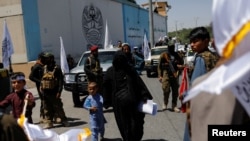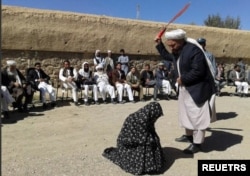On September 4, the Afghan news channel TOLOnews quoted Taliban spokesman Zabiullah Mujahid insisting that Afghanistan’s Taliban government only ensures the security of relief groups and does not interfere in their affairs. The comment came in response to rising criticism of the Taliban’s systematic obstruction of international efforts to deliver aid to the impoverished Afghans.
“The Islamic Emirate of Afghanistan does not interfere in the affairs of any institution to disrupt their work. We and our military are obliged to ensure their security," the Taliban spokesman said.
That is false.
Since the Taliban returned to power in Afghanistan in August 2021, the United Nations and international aid organizations have reported numerous incidents in which Taliban authorities have interfered in the distribution of humanitarian aid in the country.
The United Nations Office for the Coordination of Humanitarian Affairs (OCHA) said, in its August 17 report, that the U.N. relief partners in Afghanistan recorded at least 150 incidents in July alone. Ninety-five percent of these incidents have been “authored by De-facto Authority (DfA) and its Armed Forces” - meaning the Taliban government and military.
OCHA said these incidents involved instances of “arrests and detention of 7 staff, and destruction or damage to 8 facilities,” which led to the suspension of 56 aid programs in July.
The United Nations Assistance Mission in Afghanistan (UNAMA) detailed a rapid deterioration of the human rights situation in Afghanistan in its May-June report.
“On May 1, 2023, two Afghan female INGO [international non-governmental organization] staff were arrested by Taliban police for traveling without a mahram (male guardian), and on June 3, Taliban intelligence detained a midwife on her way to work and questioned her about her INGO employer; she was reportedly threatened with death and resigned from her position as a result.”
Such incidents are part of a pattern of actions inhibiting the ability of aid organizations to operate in Afghanistan, where an estimated 29.2 million people need humanitarian aid.
On December 24, 2022, the Taliban banned female aid workers from working in Afghanistan. The decree specified that any organization found employing women in Afghanistan would have its license revoked. This decree jeopardized the ability of aid organizations to use their labor force.
“The barring of women humanitarian staff continues to affect the reach of humanitarian assistance to women and children beneficiaries,” OCHA report stated in August.
Echoing the United Nations, the U.S. government’s Special Inspector for Afghanistan Reconstruction (SIGAR) stated on July 30, in its most recent report to the U.S. Congress:
“This quarter, Taliban interference with NGO work escalated, leading to a steady decline in humanitarian access in 2023, with a 32% increase in incidents between January and May 2023 as compared to the same period in 2022.”
Such aid interference exacerbates the lack of funding to address Afghanistan’s humanitarian crisis.
The Security Council Report, a New York-based NGO focusing on the United Nations, says in its latest monthly forecast that “the 2023 Afghanistan Humanitarian Response Plan remains underfunded” and that “only 26.8 percent of the $3.2 billion required by the plan—an amount which was revised down from $4.6 billion in early June—has been received.”
It also says there is a divide in the U.N. Security Council over how to deal with Afghanistan. The United States, France and the United Kingdom, among others, argue that Afghanistan must be pressured to “adhere to international norms … particularly regarding its policies and practices that violate the rights of women and girls,” in return for international recognition and aid.
China and Russia think the international community should provide aid to Afghanistan without linking it to issues like human rights, and they “appear to prefer dialogue and engagement with the Taliban over increased pressure.”
The United Nations Entity for Gender Equality and the Empowerment of Women, also known as U.N. Women, reported in July that 18% of organizations conducting humanitarian work in Afghanistan now were “fully or partially operating with only men.”
In any case, with key Security Council members reportedly at odds over aid to Afghanistan, the Taliban aid interference which its spokesman falsely denies is happening will be that much more consequential to Afghans in need.







